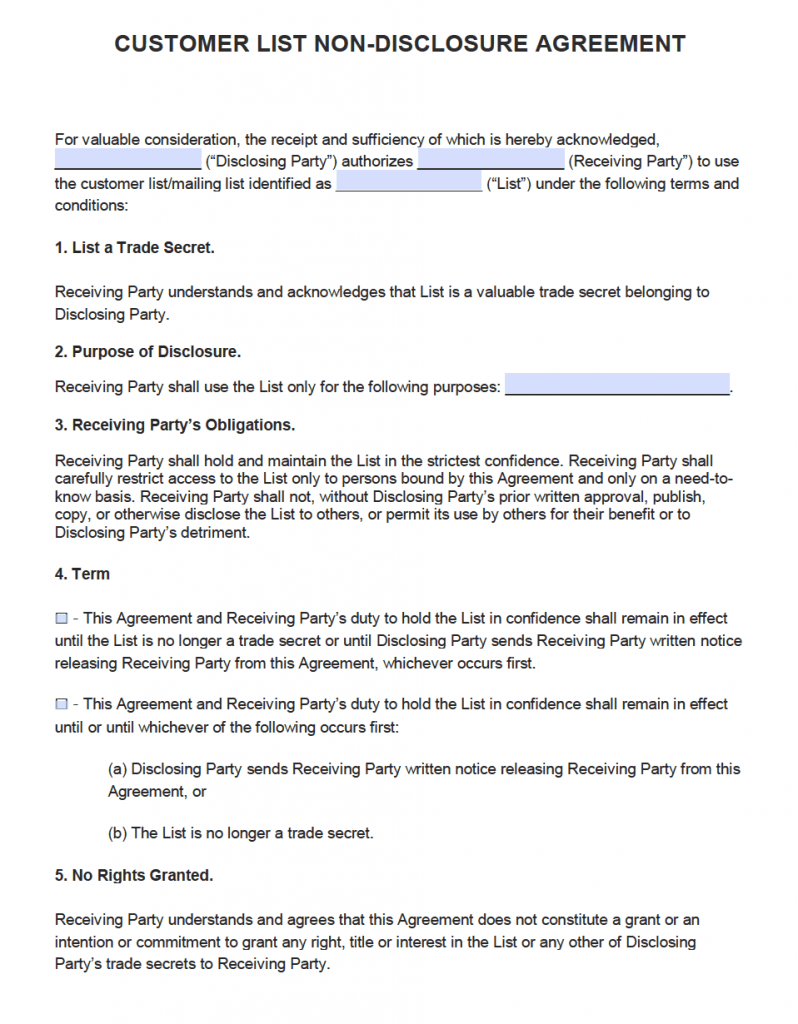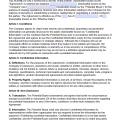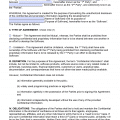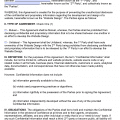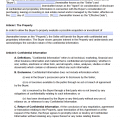Customer List Non-Disclosure Agreement (NDA)

A customer list non-disclosure agreement is for companies that sell or license their customer lists to other businesses. For example, a magazine publisher may sell its subscriber lists to an advertiser who wants to target readers by direct mail or e-mail. You can use this NDA whenever your company provides a customer list or mailing list to another company.
Sample
CUSTOMER LIST NON-DISCLOSURE AGREEMENT
For valuable consideration, the receipt and sufficiency of which is hereby acknowledged, [Full name of company] (“Disclosing Party”) authorizes [Full name of receiving party] (“Receiving Party”) to use the customer list/mailing list identified as [Provide name for list] (“List”) under the following terms and conditions:
Receiving Party understands and acknowledges that List is a valuable trade secret belonging to Disclosing Party.
Receiving Party shall use the List only for the following purposes: [Describe-for example “to distribute Receiving Party’s advertising or promotional material.”]
3. Receiving Party’s Obligations
Receiving Party shall hold and maintain the List in the strictest confidence. Receiving Party shall carefully restrict access to the List only to persons bound by this Agreement and only on a need-to-know basis. Receiving Party shall not, without Disclosing Party’s prior written approval, publish, copy, or otherwise disclose the List to others, or permit its use by others for their benefit or to Disclosing Party’s detriment.
[Alternative 1]
This Agreement and Receiving Party’s duty to hold the List in confidence shall remain in effect until the List is no longer a trade secret or until Disclosing Party sends Receiving Party written notice releasing Receiving Party from this Agreement, whichever occurs first.
[Alternative 2]
This Agreement and Receiving Party’s duty to hold the List in confidence shall remain in effect until or until whichever of the following occurs first:
(a) Disclosing Party sends Receiving Party written notice releasing Receiving Party from this Agreement, or
(b) The List is no longer a trade secret.
Receiving Party understands and agrees that this Agreement does not constitute a grant or an intention or commitment to grant any right, title or interest in the List or any other of Disclosing Party’s trade secrets to Receiving Party.
Disclosing Party warrants that it has the right to make the disclosures under this Agreement.
(a) Relationships: Nothing contained in this Agreement shall be deemed to constitute either party a partner, joint venturer or employee of the other party for any purpose.
(b) Severability: If a court finds any provision of this Agreement invalid or unenforceable, the remainder of this Agreement shall be interpreted so as to best effect the intent of the parties.
(c) Integration: This Agreement expresses the complete understanding of the parties with respect to the subject matter and supersedes all prior proposals, agreements, representations, and understandings. This Agreement may not be amended except in a writing signed by both parties.
(d) Waiver: The failure to exercise any right provided in this Agreement shall not be a waiver of prior or subsequent rights.
(e) Injunctive Relief: Receiving Party acknowledges that any misappropriation of any of the Confidential Information in violation of this Agreement may cause Disclosing Party irreparable harm, the amount of which may be difficult to ascertain, and therefore agrees that Disclosing Party shall have the right to apply to a court of competent jurisdiction for an order enjoining any such further misappropriation and for such other relief as Disclosing Party deems appropriate. This right of Disclosing Party is to be in addition to the remedies otherwise available to Disclosing Party.
(f) Indemnity: Receiving Party agrees to indemnify Disclosing Party against any and all losses, damages, claims or expenses incurred or suffered by Disclosing Party as a result of Receiving Party’s breach of this Agreement.
(g) Attorney Fees and Expenses: In a dispute arising out of or related to this Agreement, the prevailing party shall have the right to collect from the other party its reasonable attorney fees and costs and necessary expenditures.
(h) Governing Law: This Agreement shall be governed in accordance with the laws of the State of ________________.
(i) Jurisdiction: The parties consent to the exclusive jurisdiction and venue of the federal and state courts located in [insert county and state in which parties agree to litigate] in any action arising out of or relating to this Agreement. The parties waive any other venue to which either party might be entitled by domicile or otherwise.
(j) Successors & Assigns: This Agreement shall bind each party’s heirs, successors and assigns. Receiving Party may not assign or transfer its rights or obligations under this Agreement without the prior written consent of Disclosing Party. Any assignment or transfer in violation of this section shall be void.
Disclosing Party
Signature _________________
Typed or Printed Name _________________
Title: _________________
Date: _________________
Receiving Party
Signature _________________
Typed or Printed Name _________________
Title: _________________
Date: _________________
How to Write
Below we provide an explanation for each of the provisions in the Customer List Nondisclosure Agreement.
Introduction
Where indicated, list the full names of the company or person providing the list (called the “Company” in the remainder of the agreement), and the company or person receiving the list (called the “Receiving Party”). Also identify the list, either by name or some other way.
This clause makes clear that the list is your trade secret.
State here how the receiving party will be allowed to use the list. For example, for advertising purposes. The receiving party will need to get your permission for any uses not listed here.
3. Receiving Party’s Obligations
This clause requires the receiving party to treat the list as a trade secret. The receiving party may not disclose the list to others without your permission.
This clause states how long the receiving party’s confidentiality obligations will last. You’ll need to pick one of two alternatives. The first alternative provides the longest term possible-the receiving party must keep the list confidential until it is no longer a trade secret or you release the receiving party from the confidentiality obligation. This provision favors you.
The second alternative specifies an end date. Usually, this is anywhere from six months to five years.
This clause is intended to make clear that the receiving party is not acquiring any ownership rights in the list by virtue of this agreement.
A warranty is a promise. In this provision, you promise the receiving party that you have the right to disclose the list. This is intended to assure the receiving party that it won’t be sued by some third party claiming that the list belonged to it and that you had no right to reveal it to the receiving party.
These are sections that should be included in any agreement that is made that does not give a benefit to either party. This mostly identifies the agreement as a whole and the jurisdiction if there should be any issues between the parties.
